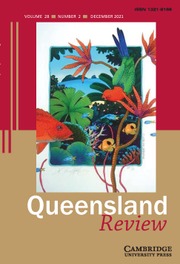Article contents
Smart State is also Creative State: Opportunities for Queensland in the Creative Industries
Published online by Cambridge University Press: 26 February 2016
Abstract
This paper analyses and critiques the Queensland Government's Research and Development (R&D) strategy that undergirds the smart state policy agenda. We argue that this strategy poorly addresses: R&D opportunities deriving from the applied social and creative disciplines; and the role of the social and creative disciplines in the development and commercialisation process for all research. Furthermore, we suggest this derives from a view of ‘smart’ which is biased towards science and technology.
Queensland can no longer afford to understand the social and creative disciplines as commercially irrelevant, ‘civilising’ disciplines. Instead they must be recognised as the vanguard of economic growth. In particular, the proposed R&D strategy does nothing to position Queensland for the emerging wave of innovation needed to meet demand for content creation in entertainment, education, government, and health information, in order to exploit universal networked broadband architectures currently in development.
Not only is research in the applied social and creative disciplines required for its own commercial potential, but also because such research must be hybridised with science and technology research to realise the commercial potential of the latter. Commercialisation depends on ‘whole product value propositions’ not just basic research. We suggest that there needs to be mechanisms whereby research in the social and creative disciplines can be meaningfully hybridised with basic research in technology to create new commercial opportunities for Queensland. To this end we describe two examples of research driven commercialisation outside science/technology, namely interaction design and broadcasting.
- Type
- Special Theme: Queensland: The Smart State
- Information
- Copyright
- Copyright © Cambridge University Press
References
- 3
- Cited by




